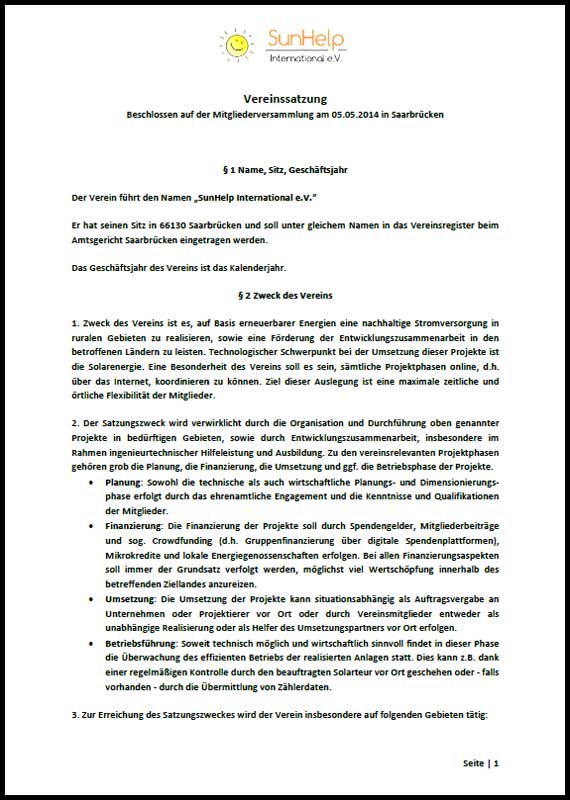The Statute of SunHelp e.V.
SunHelp International e.V. is an association registered in Germany and recognized as a non-profit organization. Here you can find our association statutes in the original version from 05.05.2014.
NGO Rules
Approved at the general meeting on May 5th, 2014 in Saarbrücken
§ 1 Name, registered office, financial year
The association bears the name "SunHelp International e.V." It has its registered office in 66130 Saarbrücken and is to be entered in the register of associations at the district court of Saarbrücken under the same name. The financial year of the association is the calendar year.
§ 2 Purpose of the association
- The purpose of the association is to implement a sustainable power supply in rural areas on the basis of renewable energies and to promote development cooperation in the countries concerned. The technological focus in the implementation of these projects is solar energy. A special feature of the association should be the ability to coordinate all project phases online, i.e. via the Internet. The aim of this interpretation is maximum flexibility in terms of time and location for the members.
- The purpose of the statute is realized through the organization and implementation of the above-mentioned projects in needy areas, as well as through development cooperation, especially in the context of engineering assistance and training. The project phases relevant to the association include roughly the planning, financing, implementation and, if necessary, the operating phase of the projects.
- Planning: Both the technical and economic planning and dimensioning phase is carried out through the volunteer commitment and the knowledge and qualifications of the members.
- Financing: The projects are to be financed through donations, membership fees and so-called crowdfunding (i.e. group financing via digital donation platforms), microcredit and local energy cooperatives. In all aspects of financing, the principle should always be followed to stimulate as much added value as possible within the target country concerned.
- Implementation: Depending on the situation, the projects can be implemented as orders to companies or project planners on site or by association members either as independent implementation or as helpers of the implementation partner on site.
- Management: As far as technically possible and economically viable, the efficient operation of the implemented systems is monitored in this phase. This can be done, for example, thanks to regular on-site inspections by the contracted solar installer or - if available - through the transmission of meter data.
- In order to achieve the purpose of the statute, the association is particularly active in the following areas:
- Planning, financing and implementation of projects for the use of renewable energies in developing countries.
- Support in the training of those affected and other interested persons to help themselves as well as a basic understanding of the correct operational management and maintenance of the systems.
- Local advice in the field of development cooperation based on renewable energies.
- Support for planned or already built renewable energy projects that pursue a charitable purpose.
- If technically feasible and economically viable; Support for technical and economic plant controlling during the operating phase.
- Educational and public relations work.
§ 3 Tax Privilege
The association pursues exclusively and directly charitable purposes within the meaning of the section "Tax-privileged purposes" of the tax code. The association is selflessly active; it does not primarily pursue its own economic purposes.
The funds of the association may only be used for the purposes specified in § 2 No. 3 of these statutes. The members do not receive any grants from the funds of the association. When they leave, they have no claims whatsoever to the association's assets. No person may be favored by expenses that are alien to the purposes of the association or by disproportionately high remuneration. Surpluses from the accounts for a financial year are carried over to the following year.
§ 4 Membership
- Members of the association can be both natural and legal persons. The association distinguishes between ordinary members and sponsoring members.
- 1a. Ordinary members are persons who are allowed to attend the general assembly and have voting rights.
- 1b. Supporting members are people who support the association financially. However, they have neither active (voting) nor passive (standing for election) voting or election rights.
- A prerequisite for regular membership is support according to § 2 as well as existing membership as a supporting member and a written application for membership as a regular member. The Executive Board decides on the application for membership to be submitted in writing by majority vote. There is no entitlement to admission. Membership begins on the day the board decision is made. With the admission the member accepts the statutes of the association.
- The prerequisite for a supporting membership is the support of the goals and tasks of the association according to § 2. With the admission the member recognizes the statutes of the association. The Board of Directors can refuse sponsoring memberships for important reasons and issue notices of termination.
- A member resigns through death, voluntary resignation, deletion from the list of members or expulsion from the association.
- Voluntary withdrawal from the association is only possible at the end of a calendar month, subject to a notice period of two weeks. The declaration of resignation must be received in writing by the Executive Board. A resigned member is not entitled to a share of the association's assets.
- A member can be removed from the list of members by resolution of the board of directors if, despite two reminders, the member is more than two months in arrears with the payment of the membership fee. The prerequisite is that more than two months have passed since the second reminder was sent and the outstanding contribution has not been paid. The member must be notified of the deletion in writing.
- A member can be expelled from the association by a resolution of the board of directors if it acts contrary to the association's goals or does not meet its obligations to the association. Before the resolution is passed, the member is to be given the opportunity to justify himself personally to the board or in writing within a reasonable period of time. Reasons must be given for the decision to exclude and the member must be informed in writing.
§ 5 Funding of the NGO
The association is financed by membership fees, the collection of donations and, if necessary, by public funds.
§ 6 Contributions
- Annual contributions are collected from both ordinary members and sponsoring members. In addition, if it serves to finance special projects, a special levy may be charged. This contribution is not mandatory for the members but is to be paid on a voluntary basis.
- The amount of the annual contribution is 30 (thirty) euros and is due on the 7th working day of the new calendar year.
- In addition, a reduced fee for pupils and students is offered. This reduced fee is 20 (twenty) euros and is due on the 7th working day of the new calendar year.
- The contributions and donations are collected and managed by the treasurer.
- The Executive Board can defer or waive contributions or allocations in individual cases.
§ 7 Board of Directors
- The board of the association consists of the chairman, two vice-chairmen and the treasurer. They form the Executive Board within the meaning of § 26 BGB. The board of directors must be a member of the association and have reached the age of 18.
- The Board of Directors is elected for a period of five (5) years. However, even after his term of office has expired, he remains in office until a new election is held. Re-election is possible. The election can take place via digital communication media.
- The association can be represented by each member of the board alone.
§ 8 General Assembly
- An ordinary general meeting takes place once a year. The meeting can take place virtually, i.e. via digital communication media.
- The General Assembly is convened by the Chairman of the Board of Directors or, if he is unable to do so, by one of the two Vice-Chairmen. The meeting is convened by means of a letter of invitation, which can be sent in electronic form. The agenda set by the board of directors is to be added to this. The letter of invitation must be sent to all regular members of the association at least 4 weeks before the proposed date of the general meeting.
- The general meeting is chaired by the chairman of the board, or if he is unable to do so, by one of the two deputies. If these are also prevented, the general assembly can elect a leader.
- An extraordinary general meeting takes place if at least 1/3 of the members request it, stating reasons. The notice period is six weeks.
- An extraordinary general meeting can also be scheduled by the board of directors if it deems it urgently necessary.
- The general meeting has a quorum if 2/3 of the full members present pass the resolution.
- Resolutions of the general meeting are passed with a 2/3 majority. Abstentions count as invalid votes. The dissolution of the association requires the votes of 80% of the full members present.
- The General Assembly must elect a minute taker. Resolutions are to be recorded in the minutes he keeps, stating the place and time of the meeting and the result of the vote. The election can take place via digital communication media.
- The minutes of the general meeting and all resolutions noted therein must be signed by at least two (2) board members.
§ 9 Amendments to the Articles of Association and Dissolution
- If the association is dissolved or if tax-privileged purposes no longer apply, the association's assets accrue to Ingenieure ohne Grenzen e.V., NGO address: Grüner Weg 11, 35041 Marburg, Office: Greifswalder Straße 4, 10405 Berlin, who has to use it directly and exclusively for charitable purposes.
- The general meeting decides on changes to the statutes, the change in the purpose of the association and the dissolution of the association (cf. § 8 No. 7 of these statutes).
§ 10 Auditing
Two auditors are to be elected at the general meeting. The term of office is five years. The auditors check the association's cash register and business at least once a year. The result is to be reported at the next general meeting.

![]()
Do you have any questions about the NGO? Please write me a message:


